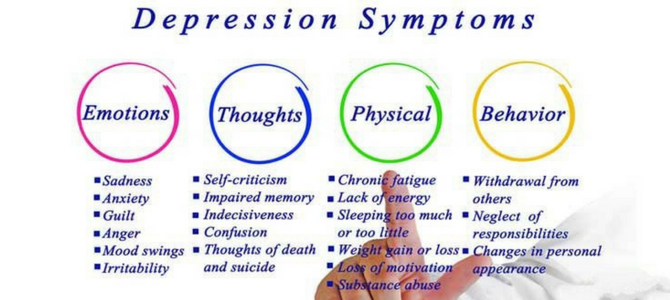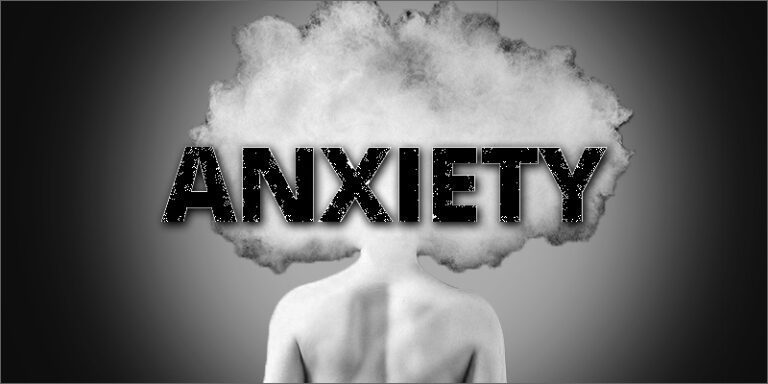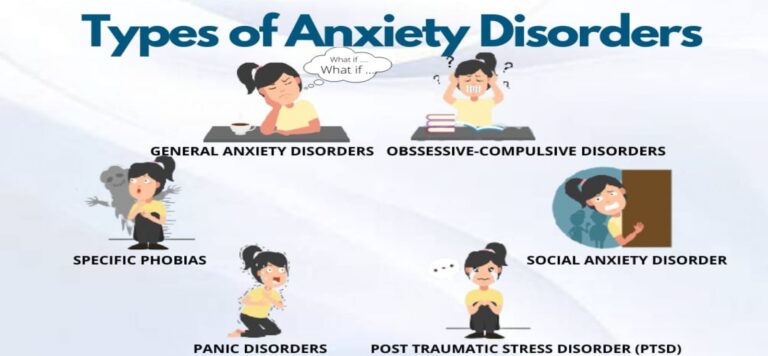Depression Meaning, Symptoms, Types, Causes and Treatments
What is Depression?
A mental health disorder characterised by persistently depressed mood or loss of interest in activities, causing significant impairment in daily life.
It’s natural to feel down sometimes, but if that low mood lingers day after day, it could signal depression.Depression is not a sign of weakness or a negative personality. It is a major publichealth problem and a treatable medical condition.
Depression—also called “clinical depression” or a “depressive disorder”—is a mood disorder that causes distressing symptoms that affect how you feel, think, and handle daily activities, such as sleeping, eating, or working.[/vc_column_text][vc_column_text]
What are the signs and symptoms of depression?
Sadness is only one small part of depression and some people with depression may not feel sadness at all. Different people have different symptoms. Some symptoms of depression include:
Physical depression:
- Fatigue and decreased energy
- Insomnia, especially early-morning waking
- Excessive sleep or difficulty in sleep
- Difficulty concentrating, remembering, or making decisions
- Persistent aches or pains, headaches, cramps, or digestive problems that do not ease even
- with treatment
- Depression can make other health problems feel worse, particularly chronic pain. Key
- brain chemicals influence both mood and pain.
Emotional depression:
- Persistent sad, anxious, or “empty” mood
- Feelings of hopelessness or pessimism
- Feelings of guilt, worthlessness, or helplessness
- Loss of interest or pleasure in hobbies or activities
- recurring thoughts of death or suicide.
Appetite Depression:
- Restlessness or irritability
- Changes in appetite or weight are another hallmark of depression.
- Some patients develop increased appetite, while others lose their appetite altogether.
- Depressed people may experience serious weight loss or weight gain.
Impact on day life
Without treatment, the physical and emotional turmoil brought on by depression can derail careers, hobbies, and relationships. People with depression often find it difficult to concentrate and make decisions. They turn away from previously enjoyable activities, including sex. In severe cases, depression can become life-threatening.
Suicide Warning Signs
People who are depressed are more likely to attempt suicide. Warning signs include talking about death or suicide, threatening to hurt people, or engaging in aggressive or risky behavior. Anyone who appears suicidal should be taken very seriously. Do not hesitate to call any of the suicide hotlines.
Depression: Who’s at Risk?
Anyone can become depressed, but many experts believe genetics play a role. Having a parent or sibling with depression increases your risk of developing the disorder. Women are twice as likely as men to become depressed.
Types of depression
- Major depression—having symptoms of depression most of the day, nearly every day for at least 2 weeks that interfere with your ability to work, sleep, study, eat, and enjoy life.
- Persistent depressive disorder (dysthymia)—having symptoms of depression that last for at least 2 years.
- Seasonal Depression: It is a type of depression that comes and goes with the seasons, typically starting in the late fall and early winter and going away during the spring and summer.
- Psychotic Depression: This type of depression occurs when a person has severe depression plus some form of psychosis, such as having disturbing false fixed beliefs (delusions) or hearing or seeing upsetting things that others cannot hear or see (hallucinations).
- Postpartum Depression: Women with perinatal depression experience full-blown major depression during pregnancy or after delivery (postpartum depression).
Causes of Depression
Depression does not have a single cause. It can be triggered by a life crisis, physical illness or something else but it can also occur spontaneously. Scientists believe several factors can contribute to depression:
- Main Causes:
- Unhealthy Food Habits and/or Incorrect Lifestyle
- Stressful Family, Work or Social conditions
- Sudden change in situations or a shocking incident
- Chronic illness or injury
- Emotional problems
- Trauma : When people experience trauma at an early age, it can cause long-term changes in how their brains respond to fear and stress. These changes may lead to depression.
- Genetics: Hormonal. changes, Mood disorders, such as depression, tend to run in families.
- Life circumstances. Marital status, relationship changes,losing a loved one, financial standing and where a person lives influence whether a person develops depression.
- Brain changes: Imaging studies have shown that the frontal lobe of the brain becomes less active when a person is depressed. Depression is also associated with changes in how the pituitary gland and hypothalamus respond to hormone stimulation.
- Other medical conditions. People who have a history of sleep disturbances, medical illness, chronic pain, anxiety and attention-deficit hyperactivity disorder (ADHD) are more likely to develop depression. Some medical syndromes (like hypothyroidism) can mimic depressive disorder. Some medications can also cause symptoms of depression.
- Drug and alcohol abuse: Approximately 30% of people with substance abuse problems also have depression. This requires coordinated treatment for both conditions, as alcohol can worsen symptoms.
- Depression can occur along with other serious illnesses, such as diabetes, cancer, heart disease, and Parkinson’s disease. Depression can make these conditions worse and vice versa.
Treatments for depression
- Talk Therapy for Depression : Studies suggest different types of talk therapy can fight mild to moderate depression.
- Cognitive behavioral therapy: It aims to change thoughts and behaviors that contribute to depression.
- Interpersonal therapy : It identifies how your relationships impact your mood.
- Psychodynamic psycho therapy:It helps people understand how their behavior and mood are affected by unresolved issues and unconscious feelings. Some patients find a few months of therapy are all they need, while others continue long term.
- Medication for depression
- Exercise for Depression
- Pets for depression
- The Role of Social Support
- Light Therapy (Phototherapy):It involves sitting in front of a specially designed light box that provides either a bright or dim light for a prescribed amount of time each day.
- Vagus Nerve Stimulation (VNS): VNS is like a pacemaker for the brain. The surgically implanted device sends electrical pulses to the brain through the vagus nerve in the neck. These pulses are believed to ease depression by affecting mood areas of the brain.
- Electroconvulsive Therapy (ECT): This treatment uses electric charges to create a controlled seizure.
- Transcranial Magnetic Stimulation: This treatment aims electromagnetic pulses at the skull. It stimulates a tiny electrical current in a part of the brain linked to depression.





